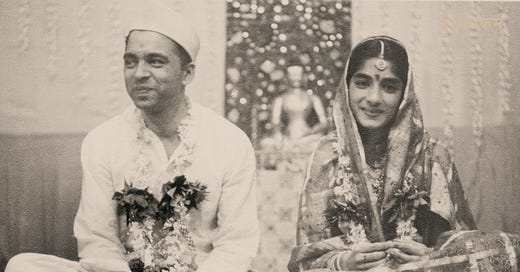Last week I went to the Metrograph theater in New York City to watch a screening of Anand Patwardhan’s latest work, Vasudhaiva Kutumbakam (The World is Family.) While introducing the film at the Metrograph, film-maker Mira Nair described Patwardhan as a “chronicler of our times” who had prevailed despite all kinds of opposition and efforts at censorship. Another screening is planned at the same venue on December 5. If you are in the area, please go and watch this 96-minute doc. (See the note from the film-maker below about the film having qualified for an Oscar.) Like all of Patwardhan’s work, this one is political in its outlook; and, unlike most of his other films, this one is intimate and personal. I found the film deeply moving and powerful.
We learn in the film’s opening minutes that it was only when his parents began to get old that Patwardhan overcame his reticence and began to film them. We watch his mother Nirmala, a famous potter, and his father, Balu, who because of heart surgercy and encephalitis has developed a speech defect. Patwardhan’s parents, and a battery of uncles who also appear in various stages of mortal decline, make for an articulate, often amusing, even acerbic, group but they are also a frail and vulnerable lot: the viewer realizes that what we are witnessing is a documentarian’s urgent desire to save a bit of the past before it dies and disappears. The film also becomes public and political because what is shared by Patwardhan’s elders are invaluable memories of their families’ participation in India’s freedom struggle. We see Nirmala with Mahatma Gandhi and we learn about Patwardhan’s uncles, Achyut and Rau, who were well-known veterans of socialist and Gandhian nonviolent resistance during the decades leading to Independance.
One of the hallmarks of Patwardhan’s documentaries is his own presence in his films as an interrogator of received wisdom: you hear him asking questions from behind the camera. “How do you know what you know?” The viewer is thereby granted a critical outlook: we are transformed into people who are curious and inquiring. Such moments take place not only when Patwardhan interacts with his parents (his mother and father take their place as very particular individuals with their strengths and foibles) but also when he takes his camera to the places in his family’s past. The film becomes a document about the decline in our democratic spaces, particularly when it comes to religion. At the end, The World is Family is a loving tribute to the film-maker’s parents and their generation of fighters for freedom. It is also a film that offers us a choice between two distinct kinds of families: one that was based on Gandhi’s idea of nonviolence and love (see photo 1 below) and the other that held on to a fanatical belief in violence and hate (see photo 2 below of the conspirators involved in Gandhi’s killing).
[UPDATE. Here’s a note from the film-maker: “… in a miracle of sorts our zero budget home movie 'The World is Family' has qualified for an Oscar. Technically it is far from spectacular, shot over 25 years on B equipment that was outdated even at the time, but it does capture the spirit of some of those who fought for India's freedom.
The first cut off to the top 15 docu films will happen in mid December or so. The next cut will bring the field down to 5 nominees. Without lobby power we are unlikely to climb the ladder but sitting in India I'd still like to do what is possible without spending money. Even getting close can broaden the footprint of a film that fights against a majoritarian rewriting of history and an ideology of othering.
There is no level playing field as far as I can see and no way to ensure that those qualified to vote will actually switch on their computers to watch any particular film. In other words everything depends on lobbying and publicity. So any buzz in your region could be useful but in truth I have no idea how these things work in the absence of a sales agent or promoter - maybe they just don’t.]








Ami, Rushing to get a ride on the magic carpet to NYC for tomorrow's showing.
Thinking often now of the film maker's question--how do you know what I know ?
I was able to watch this at Mami last year and I enjoyed it so much. There were times when I cried and times when I laughed.